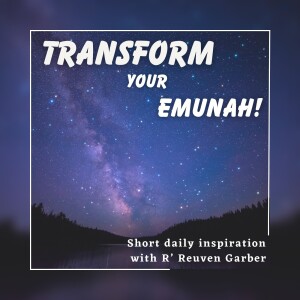
Monday Jan 27, 2025
246 - What's It All About?
We've been discussing how Hashem created the world just to give to us. Ultimately, that takes place in the next world, in Olam Haba, and our job in this world is to earn our place in the next world. And as Torah commentaries teach, the main way that we earn our place in the next world is by making our maximum effort to excel in our emunah and bitachon endeavor in this world. And as we've been discussing, one of the main ways to express our emunah in this world is by talking to Hashem in our own words, something that is available to every single one of us, regardless of our background.
As we've pointed out many times, although the exercise of talking to Hashem is something which should be a basic equation to us, when we contemplate on the fact that Hashem is in true control of the entire world, and if I understand that Hashem can hear me, that is certainly the main effort that I should make in any endeavor I might be delving into. It is also motivating to see what the many Torah sources write about the greatness of talking to Hashem in our own words. Perhaps sometimes counterintuitive, when one sits down to try study a difficult section of Torah or perhaps perform a difficult mitzvah, one understands that this is something great that I am doing, and even though it is a difficult endeavor, I know that it is worthwhile; however, when it comes to talking to Hashem, sometimes it seems like, can such an easy endeavor be so powerful?
Again, it's not always so easy to talk to Hashem, especially for longer periods, however, it is something that is available to every single one of us, for free, at any moment, in any place, and one sometimes can feel, is this really something so great? We do not make our conclusions based on our own perspective, which we've discussed many times can certainly be mistaken, but rather we follow the perspective of the Torah, which is the only true perspective, Hashem's perspective. Many Torah sources teach that the greatness of talking to Hashem in one's own words is one of the greatest possible mitzvos that we could tap into in this world. Talking to Hashem in one's own words was something that was practiced throughout history, right from the beginning of creation, throughout the generations of our greats, all the way through till today. It can be inspiring and motivating when we study sources from Torah literature which highlight these concepts.
In Parashat Bereishit, chapter 2, verse 5, the Torah states that at the creation of the world, Hashem did not let the grass grow. Only once Adam, man, was created, did Hashem cause the grass to grow. And Rashi there explains that this was because Hashem desires our praise, and before Adam was created, there was no one to pray for rain. Once He was created, however, Adam prayed for Hashem to send rain, which Hashem then did and the grass then began to grow. We are learning here how the very first individual, Adam HaRishon, would speak to Hashem, and how the Torah places great emphasis on having this relationship with Hashem to the point that Hashem did not allow the grass to grow until Adam would go ahead and pray for the grass to grow. Because much more important than there being grass in the world, is there being the prayers that people make to Hashem.
In the Zohar Chadash on Noach 34b, it states that after the flood, when Noach left the ark and encountered a desolate world, he began to cry in prayer to Hashem. He argued in personal prayer that even though the people sin severely, it would have been appropriate for Hashem to show His compassion and mercy to humankind. Hashem then rebuked Noach, saying that when He had initially informed him that He was going to destroy the world, that was the time to entreat Him to save humankind. Now, however, after the flood and everything had already been destroyed, His prayers came too late. We are learning here how Noach was reprimanded for neglecting to talk to Hashem. Again, we see the tremendous importance that the Torah places on our personal prayers and something that was practiced already, right from the beginning when the world was created initially. Every single one of us has the constant opportunity to talk to Hashem in our own words, one of the greatest mitzvahs that can exist.
No comments yet. Be the first to say something!